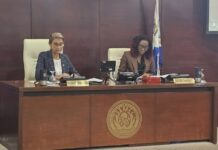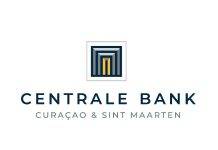DAWN BEACH – The Ministry of Finance called upon key (internal) stakeholders to take part in a critical discussion during the Tax Summit of Friday, June 17, to improve tax compliance.
In attendance were Prime Minister William Marlin, Minister Public Health Social Development and Labor Affairs Emil Lee, and Minister of Education, Culture, Youth, and Sports Silveria Jacobs, during the first hour as well as representatives of the various Ministries of Government and SZV, SOAB, SER, CFT, Ombudsman and Council of Advice.
“A lot of territory was covered. We are all in this together because we will either pick the fruits or drink the vinegar,” said Minister of Finance Richard Gibson.
The Tax Administration generates about 85% of the countries revenues, which is now in decline. At 22.9 percent of the GDP, St. Maarten is severely underperforming in tax collection compared to some of the other countries in the region. Topics of discussion covered internal, inter-departmental concerns and external threats.
The current Tax Administration has inherited many of its issues from the former Netherlands Antilles, which have not been adequately addressed, and is now faced with the lack of budget to invest in the necessary solutions.
Head of Tax Administration Sherry Hazel emphasized the importance of the strategic plan for the Tax Administration (2016-2018) and highlighted the need to update its ICT infrastructure as a high priority target, which is one of the essential factors to increase compliance and to meet international standards as well as improving local data sharing.
Furthermore, housing, re-education of existing staff and employing additional staff are all on the priority agenda of the Tax Administration. Combined, these improvements would not only fulfill the requirement to increase revenues, but also improve customer service and communication.
The biggest concern of the Tax Administration at this time is the lack of investment capacity to put its strategic plan into action.
Financial consultant and Tax advisor Etienne Ys presented the results of an assessment of the Tax Administration, which encompasses the strategic plan of the Tax Administration, the required stakeholder collaborations, investment and prospect on return on investment; a 3-year phased transformation plan for the Tax Administration services of St. Maarten. According to Ys, the plan would increase tax revenue to at least 26 percent of GDP within 3 years and produce an annual revenue of NAf. 500 million.
This increase will significantly bring St. Maarten in reach of the 30 percent of GDP comparable to the neighboring countries. This would enable the Government to mitigate the unbalanced income distribution in the country, properly invest in education, public health, youth, sport, justice, tourism, infrastructure and the environment, induce fair competition in the marketplace and more.
“St. Maarten should strive for a smart state-of-the-art Tax Administration. An administration with a 21st century IT system, with which the taxpayer can fulfill all its duties over the internet. An administration with a one-window approach,” said Ys.
With the transformation and implementation of some of these improvements the Tax Administration could become more capable to adapt and perform tax reform on the midterm. How and what the possibilities in this area are, is reliant on the transformation of the Tax Administration.
Secretary General Arno Peels and Head of the Department of Fiscal Affairs Janio Chayadi gave a brief overview of the tax framework that has been approved by the Council of Ministers. Most notable in this field is broadening the tax payers’ base by simplifying the regime, abolish undesirable regulations and a shift from direct to indirect taxes. This message follows the leading international perceptions as presented in the Mirrlees Review in 2011.
Minister of Finance Gibson spoke clearly in addressing the attendees, stating that the issues at hand concerns everyone and full cooperation is required between all entities. Chairman of SZV Glen Carty shared the success of working together, in reference to the Tripartite of the new national hospital project. “We put aside our kingdoms and our egos for Country St. Maarten,” he stated.
An example of further elaboration of “success through collaboration” was given by Elton Felisie of SZV. In the first 5 months of 2016, SZV was able to significantly increase collections for AOV/AWW and ZV/OV combined by 13.9 percent in comparison to 2015. This was achieved through collaboration with the entity SBAB. Felisie pointed out the collaboration opportunities that exist in his view.
Throughout the summit, attendees also made clear statements on not forgetting the “people aspect” when approaching change. “The people of St. Maarten must be taken into consideration at all phases and improving education as well communication is key to acquiring a voluntary compliance climate.”
Minister Gibson closed the Tax Summit by emphasizing to all present that, “the required change is not optional, it is a must!” Concerns regarding guarantee of implementation of new plans and actions in a climate of unstable government were acknowledged by the Minister, however, not considered as valid reasons not to act now.
“There are two guarantees in life; death and taxes,” quipped Minister Gibson.
In photo: A cross section of the attendees at the Tax Summit including Prime Minister William Marlin, Minister of Finance Richard Gibson, Head of Tax Administration Sherry Hazel and Minister of Public Health, Social Development and Labor Affairs Emil Lee.




























